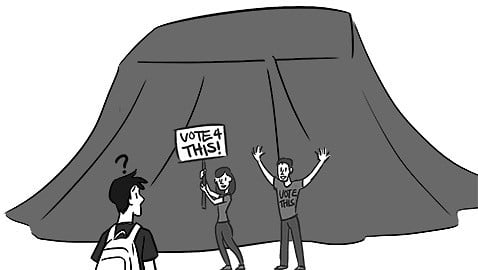Associated Students should ensure that voters have the opportunity to educate themselves on A.S. Election issues ahead of time.
Lime green is this year’s color of choice for the campaign to get UCSD students to the “polls” to vote for our next round of student representatives on A.S. Council. But like with many premature fruits, the lime green may have meant “too soon” for the speed with which this year’s election was put together by Council’s impartial support staff.
First off, it took far too long for any students to understand what was going to actually appear on the ballot. The UCSD Guardian originally reported that the long-awaited transportation referendum (which, if passed, would raise student fees by about $50 per quarter to pay for the cost of a regional transit pass) would be front and center on this week’s ballot. After the language ping-ponged between A.S. Council, the Graduate Student Association, the University of California Office of the President and others, the proposition’s text was not finalized in time for this election. As a result, it will be delayed a few weeks and appear on the ballot of a Week 8 special election.
Adding to the problem of the referendum’s absence from the ballot was that the transportation referendum’s omission was poorly communicated to the general campus community. On the A.S. Elections webpage, no mention of the transportation referendum or any item that wasn’t a candidate could be found. This is particularly unfair to voters on Monday who opened Tritonlink to find that there were two additional ballot items: the referenda on constitutional changes and a graffiti space. The lack of communication may have negatively impacted the student voter’s role in the election process and resulted in confused, uninformed decisions.
There was no web mention of the main referendum that does appear in this week’s ballot — the constitutional amendments that would introduce new positions for international student senators and trim Council in other areas. Essentially, to know what was appearing on the ballot before Monday morning, a student voter would have needed to been either on A.S. Council or in the Guardian office on Sunday during our annual endorsements issue planning. While the Guardian editorial board does in fact endorse a “yes” vote on the constitutional changes, we think that having students unable to do their own background research on the proposed changes is a poor decision by A.S. Council election administrators. This oversight only dredges up bad memories of previous suspicious election manipulations by our student government.
In 2012, when A.S. Council prepared to release a ballot initiative that would raise student fees to fund a potential move to Division-I athletics, an internal memo that the Guardian discovered revealed that some supporters of the Division-I bill had told others to hide the fact that students would be voting on a fee increase. They hoped that by keeping publicity at a minimum, voters would be tricked into just supporting the referendum without considering the financial implications. Once word began to spread, a large “D-I Not Now” campaign sprung up to combat not only the initiative itself, but also the lack of information being distributed from the election managers themselves. To compare, the anti-Division-I movement began weeks before the election while the “Streamline A.S.” campaign to support this year’s referendum seems to have only cropped up in the past few days.
The simple solution: Provide students with a sample ballot before the election actually begins to take place. Forcing students to do research on the ballot initiative in the middle of voting essentially prevents them from making informed decisions. An impulsive vote on an issue such as the transportation referendum, for example, could have serious consequences. Voter education will ultimately lead to strong representation and empowerment of the student vote.
However, there is praise due for the candidates this year in regard to inter-slate arguments. While last year’s top two slates exchanged roughly 30 grievances that delayed election results, this year has, so far, been far more peaceful. By press time on Wednesday, only four grievances had been filed and one has been resolved. We applaud both Let’s Act! and Tritons Forward for keeping this election amicable and relevant to the issues the next Council will address.
The candidates for this year have made an incredible stride toward civility and the improvement of campus services and programs. Nearly all the candidates that the Guardian Editorial Board interviewed last week pledged to keep civility alive into their terms in office and to avoid slate politics. We’re all looking forward to a headache-free year on the fourth floor of Price Center.








